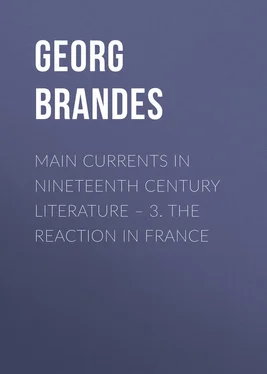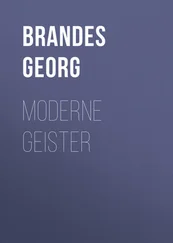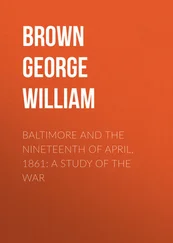Georg Brandes - Main Currents in Nineteenth Century Literature – 3. The Reaction in France
Здесь есть возможность читать онлайн «Georg Brandes - Main Currents in Nineteenth Century Literature – 3. The Reaction in France» — ознакомительный отрывок электронной книги совершенно бесплатно, а после прочтения отрывка купить полную версию. В некоторых случаях можно слушать аудио, скачать через торрент в формате fb2 и присутствует краткое содержание. Жанр: foreign_antique, foreign_prose, на английском языке. Описание произведения, (предисловие) а так же отзывы посетителей доступны на портале библиотеки ЛибКат.
- Название:Main Currents in Nineteenth Century Literature – 3. The Reaction in France
- Автор:
- Жанр:
- Год:неизвестен
- ISBN:нет данных
- Рейтинг книги:4 / 5. Голосов: 1
-
Избранное:Добавить в избранное
- Отзывы:
-
Ваша оценка:
- 80
- 1
- 2
- 3
- 4
- 5
Main Currents in Nineteenth Century Literature – 3. The Reaction in France: краткое содержание, описание и аннотация
Предлагаем к чтению аннотацию, описание, краткое содержание или предисловие (зависит от того, что написал сам автор книги «Main Currents in Nineteenth Century Literature – 3. The Reaction in France»). Если вы не нашли необходимую информацию о книге — напишите в комментариях, мы постараемся отыскать её.
Main Currents in Nineteenth Century Literature – 3. The Reaction in France — читать онлайн ознакомительный отрывок
Ниже представлен текст книги, разбитый по страницам. Система сохранения места последней прочитанной страницы, позволяет с удобством читать онлайн бесплатно книгу «Main Currents in Nineteenth Century Literature – 3. The Reaction in France», без необходимости каждый раз заново искать на чём Вы остановились. Поставьте закладку, и сможете в любой момент перейти на страницу, на которой закончили чтение.
Интервал:
Закладка:
"We must remember," says Kierkegaard ( Begrebet Ironi , p. 322), "that Tieck and the entire Romantic School entered, or believed they entered, into relations with a period in which men were, so to speak, petrified, in final, unalterable social conditions. Everything was perfected and completed, in a sort of divine Chinese perfection, which left no reasonable longing unsatisfied, no reasonable wish unfulfilled. The glorious principles and maxims of 'use and wont' were the objects of a pious worship; everything, including the absolute itself, was absolute; men refrained from polygamy; they wore peaked hats; nothing was without its significance. Each man felt, with the precise degree of dignity that corresponded to his position, what he effected, the exact importance to himself and to the whole, of his unwearied endeavour. There was no frivolous indifference to punctuality in those days; all ungodliness of that kind tried to insinuate itself in vain. Everything pursued its tranquil, ordered course; even the suitor went soberly about his business; he knew that he was going on a lawful errand, was taking a most serious step. Everything went by clockwork. Men waxed enthusiastic over the beauties of nature on Midsummer Day; were overwhelmed by the thought of their sins on the great fast-days; fell in love when they were twenty, went to bed at ten o'clock. They married and devoted themselves to domestic and civic duties; they brought up families; in the prime of their manhood notice was taken in high places of their honourable and successful efforts; they lived on terms of intimacy with the pastor, under whose eye they did the many generous deeds which they knew he would recount in a voice trembling with emotion when the day came for him to preach their funeral sermon. They were friends in the genuine sense of the word, ein wirklicher Freund, wie man wirklicher Kanzleirat war ."
I fail to see anything typical in this description. Except that we wear round hats instead of peaked ones, every word of it might apply to the present day; there is nothing especially indicative of one period more than another. No; the distinctive feature of the period in question is the gifted writer's, the Romanticist's, conception of philistinism. In my criticism of Johan Ludvig Heiberg's first Romantic attempts, I wrote: "They (the Romanticists) looked upon it from the philosophical point of view as finality, from the intellectual, as narrow-mindedness; not, like us, from the moral point of view, as contemptibility. With it they contrasted their own infinite longing… They confronted its prose with their own youthful poetry; we confront its contemptibility with our virile will" ( Samlede Skrifter , i. p. 467). As a general rule, then, they, with their thoughts and longings, fled society and reality, though now and again, as already indicated, they attempted, if not precisely to realise their ideas in life, at least to sketch a possible solution of the problem how to transform reality in its entirety into poetry.
Not that they show a spark of the indignation or the initiative which we find in the French Romantic author (George Sand, for instance); they merely amuse themselves with elaborating revolutionary, or at least startling fancies.
That which Goethe had attained to, namely, the power of moulding his surroundings to suit his own personal requirements, was to the young generation the point of departure. In this particular they from their youth saw the world from Goethe's point of view; they made the measure of freedom which he had won for himself and the conditions which had been necessary for the full development of his gifts and powers, the average, or more correctly the minimum, requirement of every man with talent, no matter how little. They transformed the requirements of his nature into a universal rule, ignored the self-denial he had laboriously practised and the sacrifices he had made, and not only proclaimed the unconditional rights of passion, but, with tiresome levity and pedantic lewdness, preached the emancipation of the senses. And another influence, very different from that of Goethe's powerful self-assertion, also made itself felt, namely, the influence of Berlin. To Goethe's free, unrestrained humanity there was added in Berlin an ample alloy of the scoffing, anti-Christian spirit which had emanated from the court of Frederick the Great, and the licence which had prevailed at that of his successor.
But both Goethe and Schiller paved the way for Romanticism not only positively, by their proclamation of the rights of passion, but also negatively, by the conscious attitude of opposition to their own age which they assumed in their later years. In another form, the Romanticist's aversion to reality is already to be found in them. I adduce two famous instances of the astonishing lack of interest shown by Goethe, the greatest creative mind of the day, in political realities; they prove at the same time how keen was his interest in science. Writing of the campaign against France during the French Revolution, a campaign in which he took part, he mentions that he spent most of his time in observing "various phenomena of colour and of personal courage." And after the battle of Jena Knebel writes: "Goethe has been busy with optics the whole time. We study osteology under his guidance, the times being well adapted to such study, as all the fields are covered with preparations." The bodies of his fallen countrymen did not inspire the poet with odes; he dissected them and studied their bones.
Such instances as these give us some impression of the attitude of aloofness which Goethe as a poet maintained towards the events of his day. But we must not overlook the fine side of his refusal to write patriotic war-songs during the struggle with Napoleon. "Would it be like me to sit in my room and write war-songs? In the night bivouacs, when we could hear the horses of the enemy's outposts neighing, then I might possibly have done it. But it was not my life, that, and not my affair; it was Theodor Körner's. Therefore his war-songs become him well. I have not a warlike nature nor warlike tastes, and war-songs would have been a mask very unbecoming to me. I have never been artificial in my poetry." Goethe, like his disciple Heiberg, was in this case led to refrain by the strong feeling that he only cared to write of what he had himself experienced; but he also tells us that he regarded themes of a historical nature as "the most dangerous and most thankless."
His ideal, and that of the whole period, is humanity pure and simple – a man's private life is everything. The tremendous conflicts of the eighteenth century and the "enlightenment" period are all, in consonance with the human idealism of the day, contained in the life story, the development story, of the individual. But the cult of humanity does not only imply lack of interest in history, but also a general lack of interest in the subject for its own sake. In one of his letters to Goethe, Schiller writes that two things are to be demanded of the poet and of the artist – in the first place, that he shall rise above reality, and in the second, that he shall keep within the bounds of the material, the natural. He explains his meaning thus: The artist who lives amidst unpropitious, formless surroundings, and consequently ignores these surroundings in his art, runs the risk of altogether losing touch with the tangible, of becoming abstract, or, if his mind is not of a robust type, fantastic; if, on the other hand, he keeps to the world of reality, he is apt to be too real, and, if he has little imagination, to copy slavishly and vulgarly. These words indicate, as it were, the watershed which divides the German literature of this period. On the one side we have the unnational art-poetry of Goethe and Schiller, with its continuation in the fantasies of the Romanticists, and on the other side the merely sensational or entertaining literature of the hour (Unterhaltungslitteratur), which is based on reality, but a philistine reality, the literature of which Lafontaine's sentimental bourgeois romances, and the popular, prosaic family dramas of Schröder, Iffland, and Kotzebue, are the best known examples. It was a misfortune for German literature that such a division came about. But, although the rupture of the better literature with reality first showed itself in a startling form in the writings of the Romanticists, we must not forget that the process had begun long before. Kotzebue had been the antipodes of Schiller and Goethe before he stood in that position to the Romanticists. Of this we get a vivid impression from the following anecdote. 4 4 Goethe, Tag- und Jahreshefte , 1802; G. Waitz, Caroline , ii. 207; Goethe-Jahrbuch , vi. 59, &c.
Интервал:
Закладка:
Похожие книги на «Main Currents in Nineteenth Century Literature – 3. The Reaction in France»
Представляем Вашему вниманию похожие книги на «Main Currents in Nineteenth Century Literature – 3. The Reaction in France» списком для выбора. Мы отобрали схожую по названию и смыслу литературу в надежде предоставить читателям больше вариантов отыскать новые, интересные, ещё непрочитанные произведения.
Обсуждение, отзывы о книге «Main Currents in Nineteenth Century Literature – 3. The Reaction in France» и просто собственные мнения читателей. Оставьте ваши комментарии, напишите, что Вы думаете о произведении, его смысле или главных героях. Укажите что конкретно понравилось, а что нет, и почему Вы так считаете.












